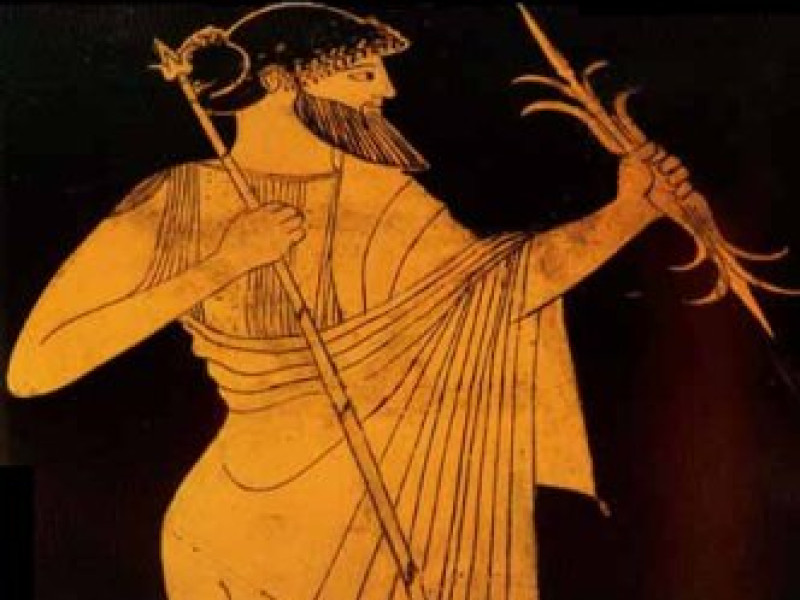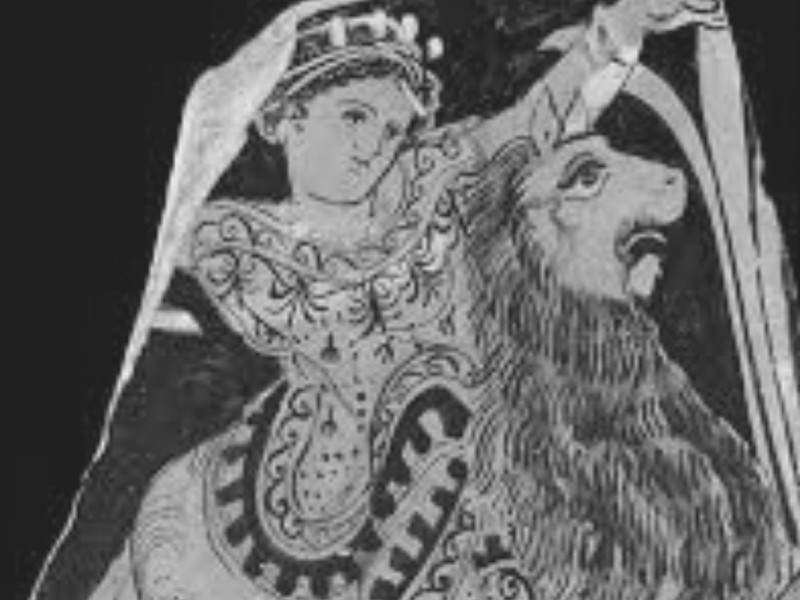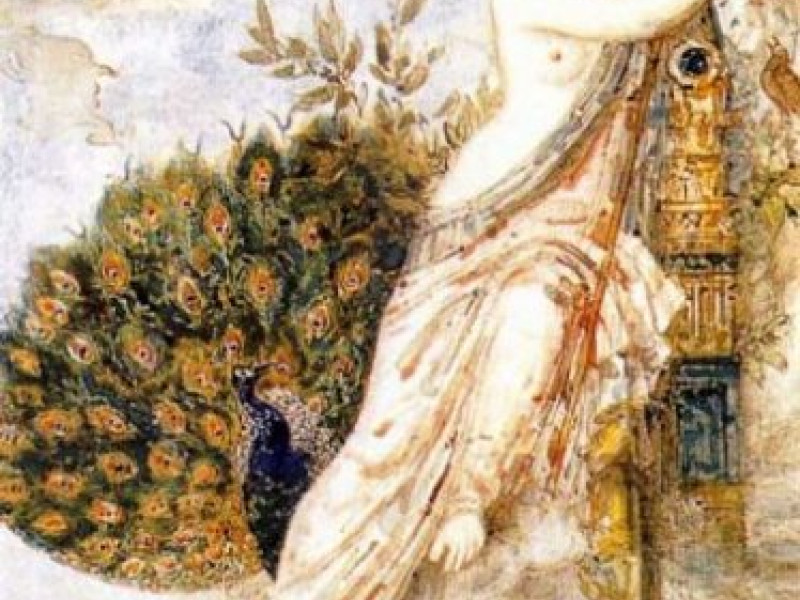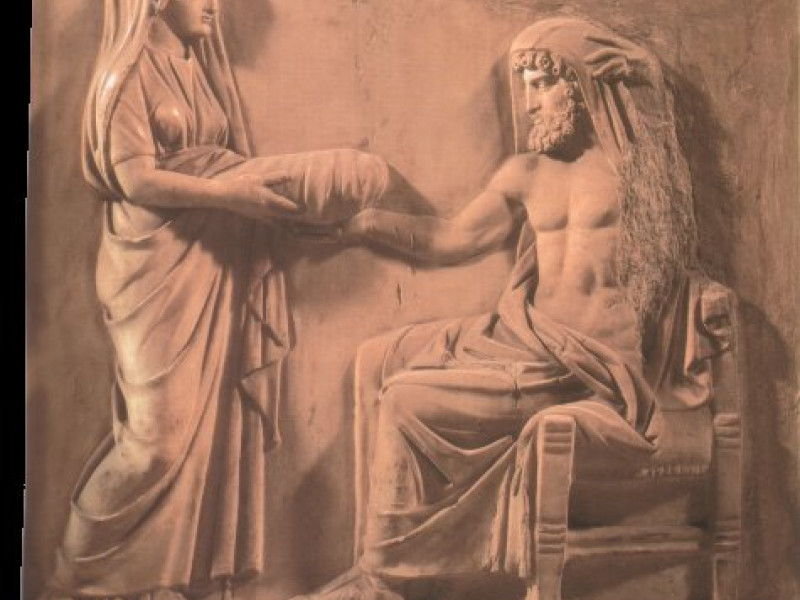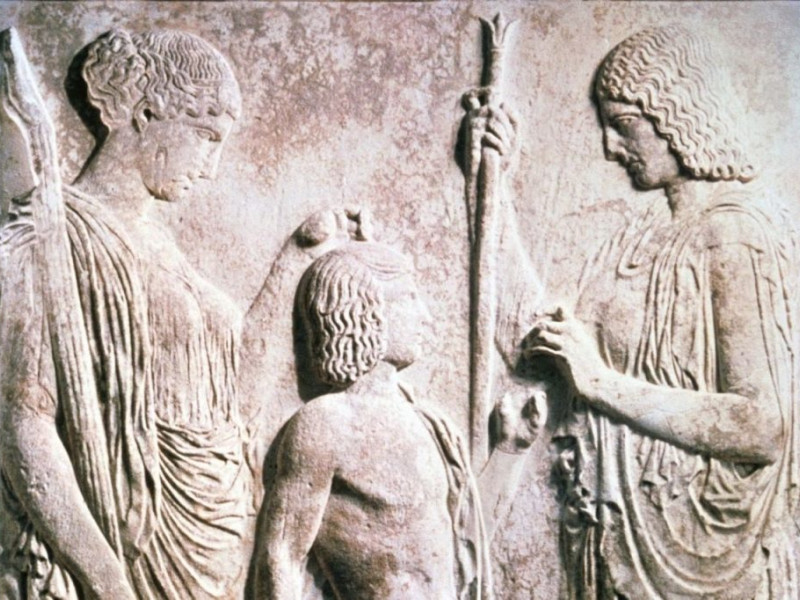Hera (Juno)
Queen of heaven. Daughter of the titans Cronus and Rhea, she was known as the Roman goddess, Juno. She was the goddess of women, marriage and childbirth.
She was sister of Zeus, Poseidon, Hades, Demeter and Hestia. She was one of the children swallowed by her father Cronus to prevent the younger gods from overthrowing him. During the war between the Titans and her brothers, Hera stayed with her uncle Oceanus who took no part in the war.
After Zeus' marriages with Metis and Themis, he decided to marry his sister, but Hera rejected him. Zeus finally deceived her by changing himself into a cuckoo. When she allowed the bird to nest between her bosom, Zeus returned to his own form and ravished her. Later she agreed to marry her brother. She bore Zeus three children, Ares, Hebe and Eileithyia.
Some say that Hephaestus was the son of Zeus and Hera. But usually the tradition says that when Zeus fathered Athena without a mother, the angry goddess decided to have a child of her own without a husband. She bore Hephaestus. However, Hephaestus was ugly and crippled. Some say that Hera threw her son out of Olympus, while others say that it was Zeus who threw Hephaestus out of heaven when Hephaestus tried to protect Hera from Zeus' attack. Hephaestus, who was an artisan of the gods and master craftsman, got his revenge by binding his mother to a golden throne. He only released her when the gods promised to marry him to the love goddess, Aphrodite.
Other possible children of Zeus and Hera were Tyche and Enyo, since Enyo often accompanied "her brother" Ares to war.
Hera's marriage was never a happy one because of Zeus' numerous love affairs with both immortal goddesses and mortal women. Hera was renowned for her jealousy and temper. She persecuted Zeus' many offspring as well as his mistresses. Some of her famous victims included the goddess and Titaness Leto; Callisto, whom she changed into a bear, and her son; Io, daughter of the river-god Inachus; Semele and her son Dionysus, god of wine.
Hera also persecuted Heracles throughout his life, afflicting him with madness. One of the most devastating events in Heracles' life was when she had driven him mad to the point where Heracles murdered his own sons. But her persecution also set Heracles on the path of glory and everlasting fame. In the end, she not only reconciled with Heracles when the hero became a god and lived in Olympus; Hera also allowed Heracles to marry her own daughter Hebe, goddess of youth.
According to the Greek geographer Pausanias, Hera had at one time stormed out of her marriage to Zeus and stayed on the island of Euboea. Zeus failed to win her back with persuasion, so he resorted to trickery. Zeus gained advice from a wise king in Plataea. At Mount Cithaeron, Zeus created a wooden statue of a woman, which he clothed with the richest gown. Zeus placed the statue in his ox-wagon, pretending that this woman would be his new bride and consort. Hera thought that her new rival was the daughter of Asopus, named Plataea. Outraged that her husband would remarry, she raced onto the scene and ripped the veil off the statue. Instead of being angry about this ruse, Hera was actually delighted with her husband's ingenuity in winning her back, so the great goddess was reconciled with Zeus.
A festival of reconciliation was held in honour of Hera at Plataea every seven years. This involved a procession with a wagon that bore a wooden image of a woman (daidala) from Cithaeron to Plataea, where the image was later burned in a fire.
The Heraean Games were established in honour of Hera, and were held every four years in Olympia. Historically, the Heraean Games were actually the oldest Panhellenic Games, even older than the Olympaid, which was also held in Olympia. Here, girls and young women participated, and each victor was awarded with a crown of olive.
She played a vital role in the downfall of Pelias. Pelias defiled her temple, when the king murdered his stepmother Sidero before her altar. She supported Jason and the Argonauts in their quest. After their adventure, Jason brought back Medea, a sorceress, who tricked Pelias' daughters into killing their own father. The whole reason behind the quest was for the goddess to exact her revenge.
Throughout the Trojan War, she sided with Greeks against Paris, a Trojan prince. Paris had awarded the golden apple, inscribed with "To the Fairest", to Aphrodite, instead of herself. Even after the fall of Troy, she persecuted Aeneas and the Trojan followers as they searched for a new home in Italy. She stirred up a war between Aeneas and the Latin tribes.
The Judgement of Paris was not the only time that she was angry with a mortal because of her looks. The great hunter Orion was first married to Side. Side had boasted that her beauty surpassed Hera, so the goddess threw the foolish woman into Hades.
Her epithet was Argeia - "Argive Hera". Her places of worship were Argos, Euboea, Samos and Stymphalus. In Argos, she contested against Poseidon for recognition as a patron deity of Argos. The contest was judged and decided by three river-gods of Argolis. They awarded Argos to Hera. Angry that he lost the city to his sister, Poseidon caused the water to dry up in one season and to flood Argos in another.
The peacock was her sacred bird, and she also seemed partial to the cuckoo. Her sacred fruits were apples and pomegranates.
Related Information
Name
Hera, Here, Ἥρα – "Protectress" (Greek).
E-RA (Mycenaean).
Juno (Roman).
Uni (Etruscan).
Festivals
Daedala.
Heraean Games
Sources
The Iliad was written by Homer.
Theogony and Works and Days were written by Hesiod.
Great Eoiae was possibly written by Hesiod.
Homeric Hymns.
The Cypria from the Epic Cycle.
Argonautica was written by Apollonius.
Madness of Heracles was written by Euripides.
Library and Epitome were written by Apollodorus.
Metamorphoses was written by Ovid.
Fabulae and Poetica Astronomica were written by Hyginus.
Prometheus' Bound and the Suppliant Women were written by Aeschylus.
Geographia was written by Pausanias.
There are too many other references to Hera, to be listed here.
By Jimmy Joe



